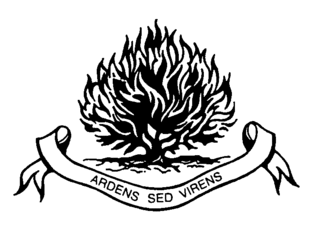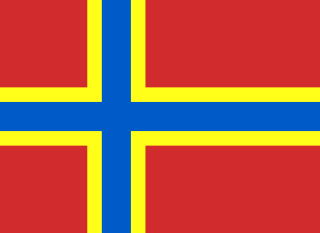
Presbyterianism is a part of the reformed tradition within Protestantism, which traces its origins to Britain, particularly Scotland.

Charles Laughton was an English-American stage and film actor. Laughton was trained in London at the Royal Academy of Dramatic Art and first appeared professionally on the stage in 1926. In 1927, he was cast in a play with his future wife Elsa Lanchester, with whom he lived and worked until his death.

New York Hospital or Old New York Hospital or City Hospital was founded in 1771 with a charter from King George III, and is the second oldest hospital in New York City, and the third oldest in the United States. It was originally located on Broadway between Duane Street and Anthony Street.
The Presbyterian Church of Aotearoa New Zealand (PCANZ) is a major Christian denomination in New Zealand. A part of the Reformed tradition, it is the largest Presbyterian denomination in New Zealand, and known for its relatively progressive stance on doctrine and social issues in comparison with smaller Presbyterian churches in the country. Presbyterianism was introduced to New Zealand by early 19th century settlers, particularly from Scotland and Ireland. It was historically most prevalent in the Otago region. The PCANZ was formed in 1901 with the amalgamation of southern and northern Presbyterian churches. It claims around 29,000 members.

Sir Francis Henry Dillon Bell was a New Zealand lawyer and politician who served as the Prime Minister of New Zealand from 10 to 30 May 1925. He was the first New Zealand-born prime minister, holding office in a caretaker capacity following the death of William Massey.

Sir Lloyd George Geering is a New Zealand theologian who faced charges of heresy in 1967 for his controversial views. He considers Christian and Muslim fundamentalism to be "social evils". Geering is Emeritus Professor of Religious Studies at Victoria University of Wellington. He turned 100 in February 2018.
The following lists events that happened during 1901 in New Zealand.
The following lists events that happened during 1933 in New Zealand.
Charles Douglas "Doug" Laughton is an English former professional rugby league footballer who played in the 1960s, 1970s and 1980s, and coached in the 1970s, 1980s and 1990s. He played at representative level for Great Britain (captain), winning 15 caps in all, winning a further cap for England, and Lancashire, and at club level for St. Helens, Wigan, Widnes, and the Canterbury Bulldogs, as a second-row, or loose forward, and coached at club level for Widnes and Leeds.

Sir Patrick Alphonsus Buckley was a New Zealand soldier, lawyer, statesman, and judge who held several high government posts in Wellington in the early 1890s.
Broughton Rangers were founded in 1877. They were one of the twenty-one clubs to meet at the George Hotel, Huddersfield on 29 August 1895 to form the Northern Rugby Football Union. They were originally based in Broughton, Salford. In 1933, they moved out of Salford and into the Manchester district of Gorton and were renamed Belle Vue Rangers in 1946. The original club folded in 1955. In 2005, local businessman, Stefan Hopewell attempted to resurrect the club and now owns the intellectual property to Broughton Rangers and Belle Vue Rangers.
John Laughton may refer to:

Henry Collin Minton (1855–1924) was the chairman of Systematic Theology in the San Francisco Theological Seminary from December 2, 1891 to October 1, 1902. He then became the minister for the First Presbyterian Church in Trenton, New Jersey.
John Bitchener was a Reform Party Member of Parliament in New Zealand. He was a cabinet minister from 1933 to 1935 in the Reform Government of New Zealand.

John Anderson was the second Mayor of Christchurch in New Zealand 1868–1869, and a successful businessman. He had a close connection with three buildings that have later received Category I heritage registrations by Heritage New Zealand. Two of these buildings were demolished following the February 2011 Christchurch earthquake.
Laughton is an English surname. Notable people with the surname include:
The Very Reverend John Spenser Somerville was a New Zealand Presbyterian leader.
Henry George Nicholls was a Congregationalist minister in England and South Australia and Presbyterian minister in Victoria, Australia.










